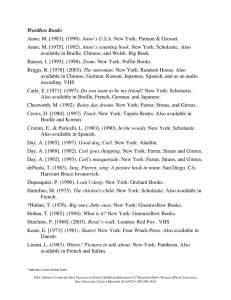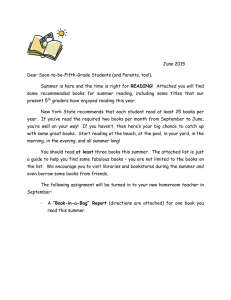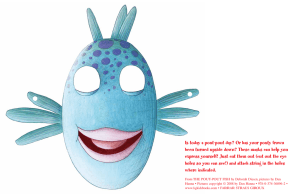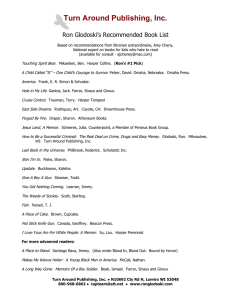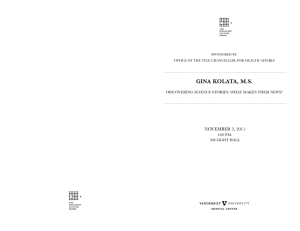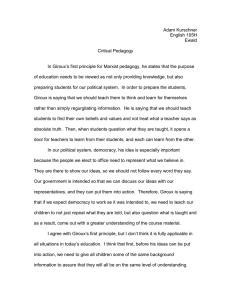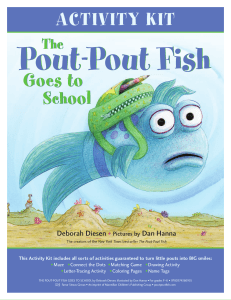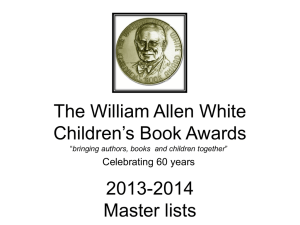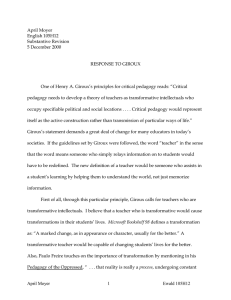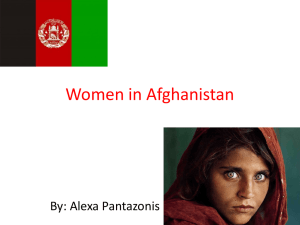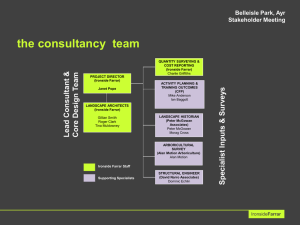1. Which one book in each category would you be most interested in
advertisement
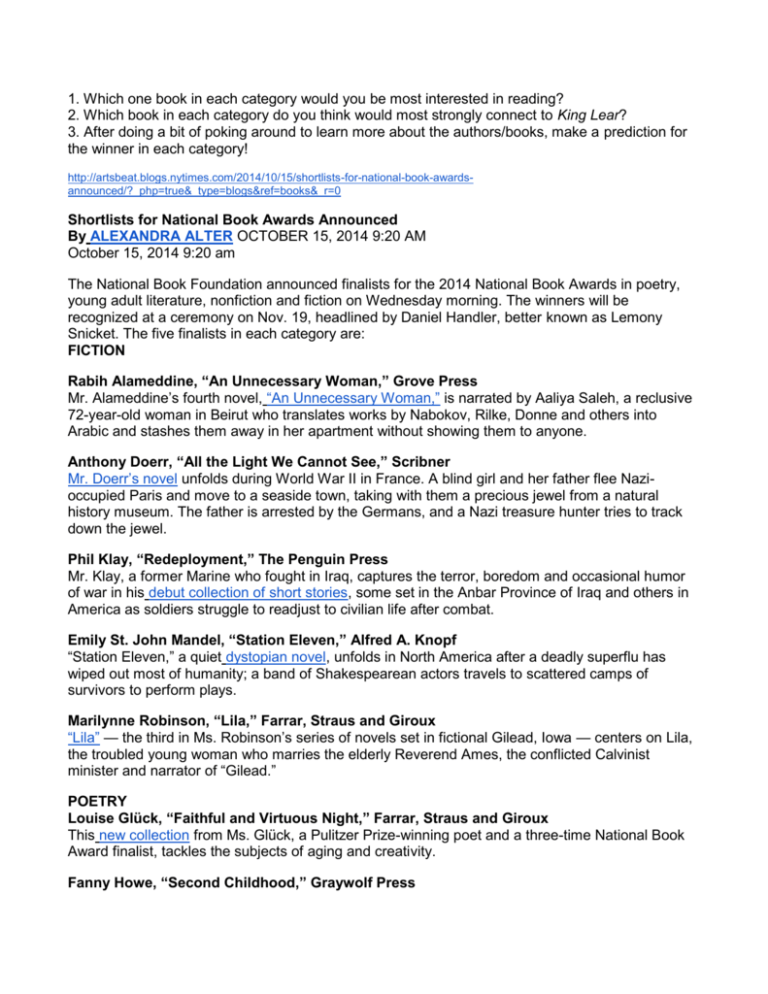
1. Which one book in each category would you be most interested in reading? 2. Which book in each category do you think would most strongly connect to King Lear? 3. After doing a bit of poking around to learn more about the authors/books, make a prediction for the winner in each category! http://artsbeat.blogs.nytimes.com/2014/10/15/shortlists-for-national-book-awardsannounced/?_php=true&_type=blogs&ref=books&_r=0 Shortlists for National Book Awards Announced By ALEXANDRA ALTER OCTOBER 15, 2014 9:20 AM October 15, 2014 9:20 am The National Book Foundation announced finalists for the 2014 National Book Awards in poetry, young adult literature, nonfiction and fiction on Wednesday morning. The winners will be recognized at a ceremony on Nov. 19, headlined by Daniel Handler, better known as Lemony Snicket. The five finalists in each category are: FICTION Rabih Alameddine, “An Unnecessary Woman,” Grove Press Mr. Alameddine’s fourth novel, “An Unnecessary Woman,” is narrated by Aaliya Saleh, a reclusive 72-year-old woman in Beirut who translates works by Nabokov, Rilke, Donne and others into Arabic and stashes them away in her apartment without showing them to anyone. Anthony Doerr, “All the Light We Cannot See,” Scribner Mr. Doerr’s novel unfolds during World War II in France. A blind girl and her father flee Nazioccupied Paris and move to a seaside town, taking with them a precious jewel from a natural history museum. The father is arrested by the Germans, and a Nazi treasure hunter tries to track down the jewel. Phil Klay, “Redeployment,” The Penguin Press Mr. Klay, a former Marine who fought in Iraq, captures the terror, boredom and occasional humor of war in his debut collection of short stories, some set in the Anbar Province of Iraq and others in America as soldiers struggle to readjust to civilian life after combat. Emily St. John Mandel, “Station Eleven,” Alfred A. Knopf “Station Eleven,” a quiet dystopian novel, unfolds in North America after a deadly superflu has wiped out most of humanity; a band of Shakespearean actors travels to scattered camps of survivors to perform plays. Marilynne Robinson, “Lila,” Farrar, Straus and Giroux “Lila” — the third in Ms. Robinson’s series of novels set in fictional Gilead, Iowa — centers on Lila, the troubled young woman who marries the elderly Reverend Ames, the conflicted Calvinist minister and narrator of “Gilead.” POETRY Louise Glück, “Faithful and Virtuous Night,” Farrar, Straus and Giroux This new collection from Ms. Glück, a Pulitzer Prize-winning poet and a three-time National Book Award finalist, tackles the subjects of aging and creativity. Fanny Howe, “Second Childhood,” Graywolf Press Ms. Howe has published more than 20 books of poetry and prose. Her latest collection “channels childlike marvel,” a reviewer for Publishers Weekly wrote. Maureen N. McLane, “This Blue,” Farrar, Straus and Giroux Ms. McLane’s third collection includes poems about nature and travel, and poems with cheeky titles like “They Were Not Kidding in the Fourteenth Century” and “Quiet Car.” Fred Moten, “The Feel Trio,” Letter Machine Editions Mr. Moten’s verse is packed with slang and contemporary language as well as jazz references. Claudia Rankine, “Citizen: An American Lyric,” Graywolf Press In “Citizen,” which has been described as “a provocative mediation on race,” Ms. Rankine mixes current events and pop culture references with personal narratives. NONFICTION Roz Chast, “Can’t We Talk About Something More Pleasant?,” Bloomsbury In her graphic memoir, Ms. Chast, a cartoonist for The New Yorker, details her parents’ final years and their struggles with dementia, illness and financial instability. “No one has perfect parents and no one can write a perfect book about her relationship to them. But Chast has come close,” Alex Witchel wrote in a review in The New York Times. Anand Gopal, “No Good Men Among the Living: America, the Taliban, and the War through Afghan Eyes,” Metropolitan Books Mr. Gopal looks at the impact of America’s war against the Taliban and Islamic extremists from the perspective of three Afghans: a Taliban commander, a warlord who is backed by the United States military and becomes rich and powerful, and a village woman who lives in fear of combatants from all sides. Evan Osnos, “Age of Ambition: Chasing Fortune, Truth and Faith in the New China,” Farrar, Straus and Giroux Drawing on his reporting as the Beijing correspondent for The New Yorker, Mr. Osnos examines China’s continuing transformation into a global economic superpower, and the clash between its economic reforms and its government’s authoritarian attacks on free speech. John Lahr, “Tennessee Williams: Mad Pilgrimage of the Flesh,” W.W. Norton & Company Mr. Lahr’s biography of Tennessee Williams explores the nexus of the playwright’s private life and his creative output, and draws on newly uncovered sources, including previously unknown letters. Edward O. Wilson, “The Meaning of Human Existence,” Liveright Publishing Corporation Mr. Wilson, the Pulitzer Prize-winning biologist, ventures into philosophical territory here, building on his explorations of how humans are altering the planet, and how we should view our place in the cosmos. Mr. Wilson, who has published more than two dozen books, was last a finalist for the National Book Award in 1972. YOUNG PEOPLE’S LITERATURE John Corey Whaley, “Noggin,” Atheneum Books for Young Readers A tragicomic novel in which a 16-year-old boy dies of leukemia — but comes back to life five years later when his parents, who had his head cryogenically frozen, find a donor body to reattach his head to. Deborah Wiles, “Revolution,” Scholastic Press Set in Mississippi in 1964, “Revolution” blends a fictional coming-of-age story with historical documents from the civil rights era, including leaflets, brochures and newspaper clippings. Jacqueline Woodson, “Brown Girl Dreaming,” Nancy Paulsen Books Ms. Woodson’s memoir in verse details her experience growing up as an African-American in South Carolina and New York during the 1960s and ’70s Eliot Schrefer, “Threatened,” Scholastic Press In Mr. Schrefer’s novel, an orphan named Luc who is struggling to get by in the African country of Gabon joins an expedition to study chimpanzees and heads deep into the jungle, where he finds a family of sorts among the apes. Steve Sheinkin, “The Port Chicago 50: Disaster, Mutiny and the Fight for Civil Rights,” Roaring Books Press Mr. Sheinkin, a former National Book Award finalist, tells the true story of a port in California where an accidental explosion killed more than 300 sailors in 1944. The Navy and the rest of the military were segregated at the time, and most of the dead and injured were African-American. The sailors protested unsafe working conditions and some were charged with mutiny.
